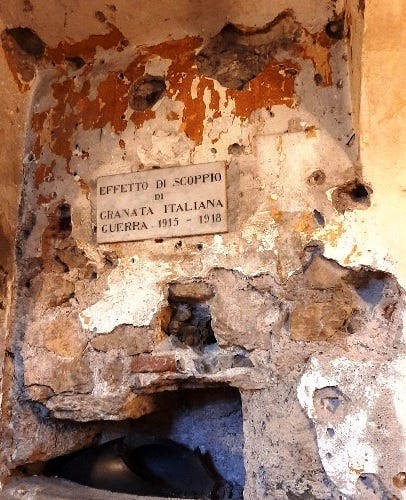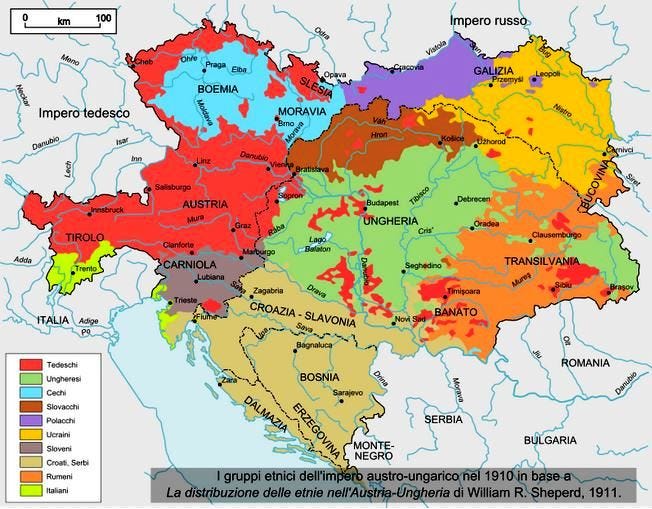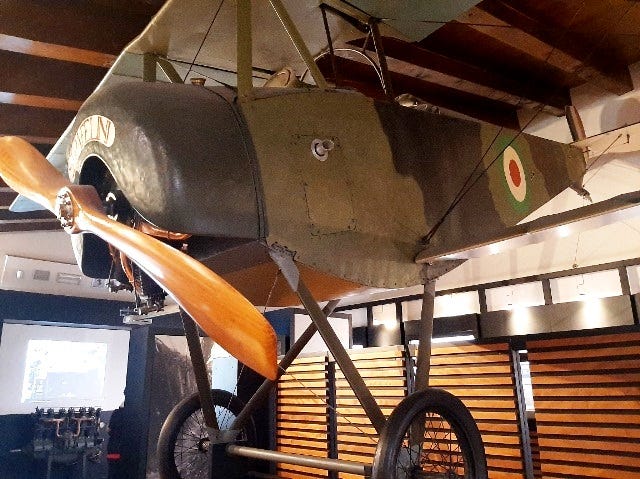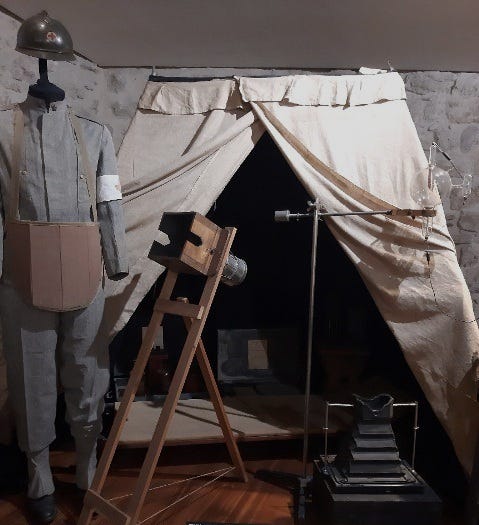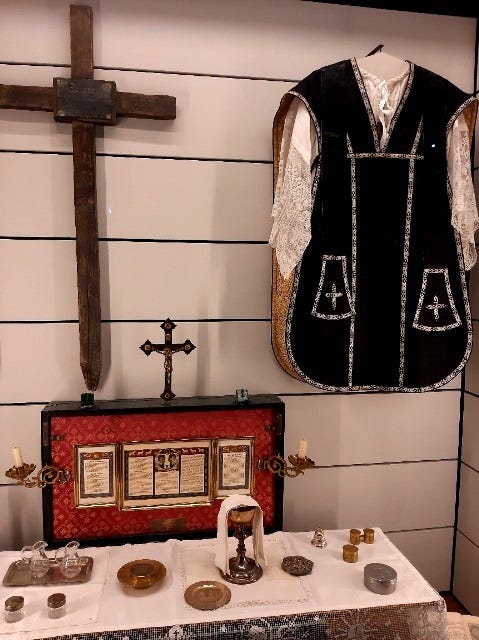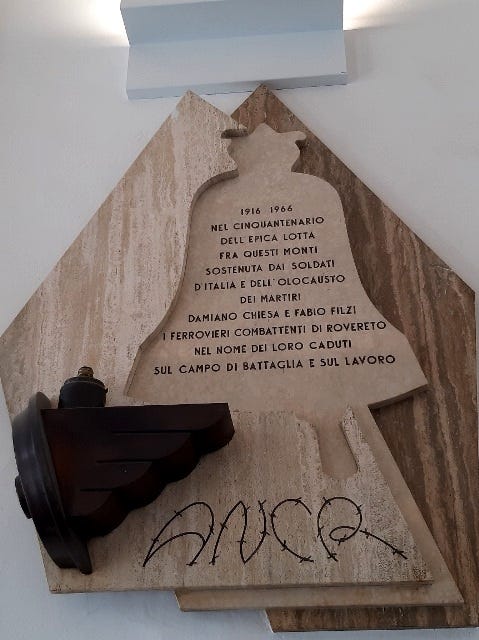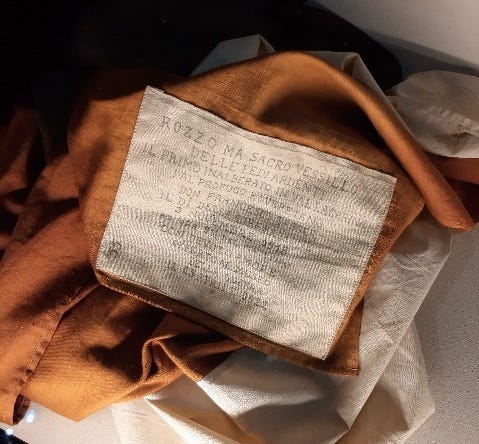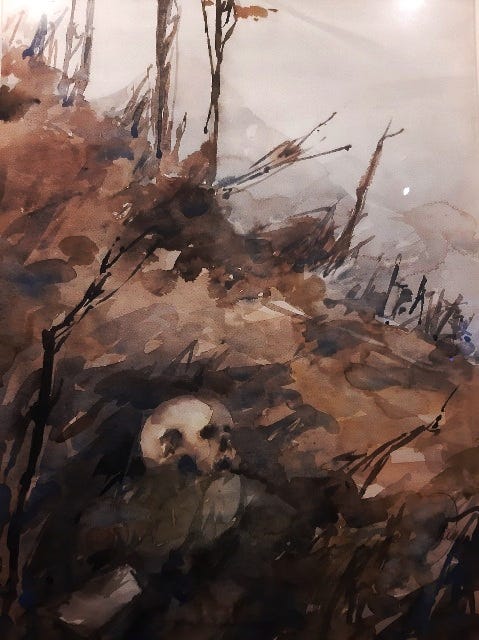Che cos'è una guerra? Ce lo racconta il Trentino
🇬🇧 What is a war? Trentino tells us
🇮🇹 Esiste una guerra peggiore di un’altra? Non credo; credo che sia sempre guerra, solo diversa in livelli di atrocità. Cantavano i soldati: erano stati convinti di servire una patria. E quella bella epoca di prima… com’è potuta finire così? Io me la immagino fatta di progresso, fioritura delle arti, condizioni di vita migliori, ideali, romanticismo… forse però tutto più goduto che costruito. Solo così io credo si spieghi il declino.
Il Museo Storico Italiano della Guerra di Rovereto, fondato nel 1921, ricostruisce fatti che al contempo spiegano la guerra
“Combattiamo a fasi isolate, ma di cosa stia succedendo non abbiamo idea... ” dice in un video un ufficiale della battaglia di Solferino (1859). La guerra esiste da sempre; a un certo punto però, qualcuno pensò bene di istituire la leva obbligatoria, aprendo la via a un belligerare non più di carriera, ma di massa.
Sotto un aereo di 6 metri un usciere mi intrattiene aggiungendo informazioni, ha voglia di parlare. A tratti si scusa per esser crudo; gli rispondo che la guerra è guerra.
La visita richiede due ore abbondanti, e quando arriva l’ora di chiudere non ho fatto in tempo a leggere della numero 2 e del macello dell’Indocina. Ma non importa: in Trentino argomento chiave è la Guerra Mondiale (non si sapeva ancora che sarebbe stata la prima), cioè quella che segna la fine del dominio austriaco.
🇬🇧 Is there one war worse than another? I don't think so; I think it is always war, just different in levels of atrocity. The soldiers sang: they had been convinced they were serving a country. And that beautiful era … how could it end like that? I imagine it as being made up of progress, blossoming of the arts, better living conditions, ideals, romanticism ... perhaps, however, all more enjoyed than built. This is the only way I believe the decline can be explained.
The Italian War History Museum in Rovereto, founded in 1921, reconstructs facts that explain what the war is
“We fight in isolated phases, but what is going on we have no idea... " says an officer at the Battle of Solferino (1859). War has always existed, only at some point in history, someone decided to institute compulsory military service, paving the way for mass warfare.
Under a 6 mt. plane an usher entertains me by adding information. At times he apologizes for being crude; I reply that war is war.
The visit takes a good two hours, and when closing time comes I have not had time to read about W Number 2 and the slaughter of Indochina. But it doesn't matter: here in Trentino (Northern Italy) key history is the World War (it was not yet known that it would be the first), that led to the end of the Austrian domination.
🇮🇹 L’Europa celebra la Rivoluzione Francese (presa della Bastiglia - 14 luglio 1789) come atto di ribellione contro le monarchie assolutistiche
Poi compare sulla scena Napoleone, un generale che si proclamerà imperatore dei Francesi, dichiarerà guerra su guerra, fino ad essere sconfitto a Waterloo ed esiliato definitivamente. Segue il Congresso di Vienna; per riportare l’ordine in Europa si decide di rimettere sui rispettivi troni gli antichi padroni. Ma le masse non ci stanno, ed è a questo punto che inizia il nostro Risorgimento, quello che porterà all’Unità d’Italia nel 1861. Dopo aver perso prima la Lombardia (nella battaglia di Solferino citata in apertura) e poi il Veneto, l’Austria si allea con l’Ungheria e nel 1867 diventa impero. Gli appartengono il Trentino (principato del Tirolo) e la Venezia Giulia (Città Imperiale di Trieste, Gorizia, Fiume e Pola). Il Tirolo, in quanto in posizione di confine, va quindi fortificato, ecco il perché di tanti castelli. Li ammiriamo come opere architettoniche, ma furono concepite in base alla loro potenza di fuoco.
L’umanità è arrivata a un secolo di rampante progresso, che vede trasporti che prima non esistevano, e un ceto benestante farsi strada anche nelle questioni politiche. Non più quindi solo o contadini o despoti. Le potenze di turno pensano ciascuno alle proprie egemonie politiche, mentre nascono movimenti che rivendicano i diritti delle minoranze ad essere indipendenti o perlomeno a godere di maggiore autonomia. I rapporti fra l’Austria-U e il Regno d’Italia sono all’insegna della strategia difensiva. Di lì a poco la cosiddetta Belle Époque naufragherà in una catastrofe senza precedenti.
🇬🇧 Europe celebrates the French Revolution (storming of the Bastille - 14th July 1789) as an act of rebellion against absolute monarchies
Then Napoleon appeared on the scene, a general who proclaimed himself emperor of the French, declared war upon war, until defeated at Waterloo and permanently exiled. The Congress of Vienna followed; to restore order in Europe it was decided to put the former masters back on their respective thrones. But the masses rebelled, and it is at this point that our Risorgimento battles began, leading to the Unification of Italy in 1861. After losing first Lombardy (at the battle of Solferino mentioned in the opening) and then Veneto, Austria allied with Hungary becoming empire in 1867, ruling over Trentino (principality of Tyrol) and Venezia Giulia (Imperial City of Trieste, Gorizia, Rijeka and Pula). As Tyrol was in a border position, it had to be fortified, hence the reason for so many castles. We admire them as architectural works, but they were designed according to their firepower.
Humanity had arrived at a century of rampant progress, with transportation that did not exist before, and a wealthy class making its way into political affairs as well. Kings were each thinking about their own political hegemonies, while movements emerged claiming the rights of minorities to be independent or at least to enjoy greater autonomy. Relations between Austria-H and the Kingdom of Italy were under the banner of defensive strategy. Soon after, the so-called Belle Époque sank in an unprecedented catastrophe.

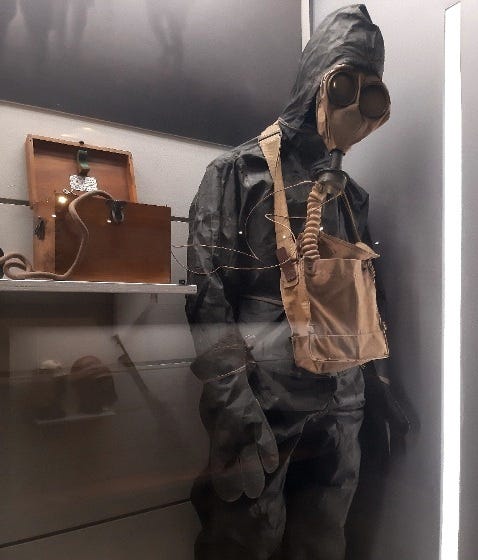
🇮🇹 La Guerra Mondiale (70 milioni di combattenti, 20 milioni fra feriti e mutilati, 10 milioni di morti) fu una guerra MAI VISTA
Ad accendere la miccia fu proprio l’Austria contro la Serbia nel 1914, in risposta all’assassinio dell’arciduca Francesco Ferdinando a Sarajevo (Bosnia).
Tutti i continenti ne furono coinvolti. Non era però più guerra da una parte e vita che continua dall’altra, ma la vita che ora doveva continuare in funzione della guerra. Fu una guerra che portò la società tutta in guerra.
Agricoltura e industria vennero ripensate in funzione del conflitto. Le donne sostituirono gli uomini nei lavori civili. Traumi e violenze in loco da parte degli eserciti occupanti… possiamo solo immaginarli. Segnò la scomparsa di ben 4 imperi (austro-ungarico, tedesco, ottomano e russo) lasciando in eredità tensioni sociali e contrasti tali da sfociare in successive dittature.
Quando scoppia il conflitto, l’Italia prima si dichiara neutrale, poi nel 1915 dichiara guerra all’odiato nemico con l’obiettivo di prendersi i territori di lingua italiana e crearsi una posizione di prestigio sul mar Adriatico.
Lo spietato generale Luigi Cadorna combatte a sangue in 11 offensive sul Carso ma è respinto pesantemente a Caporetto. Ciò nonostante, l’impero, minato sempre più da condizioni precarie e diserzioni, viene fermato nel 1918 a Vittorio Veneto, e costretto all’armistizio. l’Italia raggiunge il Brennero, e occupa Fiume, l’Istria e la Dalmazia. In Alto Adige mette però in atto una politica dura di italianizzazione nei confronti della popolazione di lingua tedesca, con conseguenze sulla stabilità interna della zona.
🇬🇧 The World War (70 million soldiers, 20 million wounded, 10 million dead) was a kind of war that NOBODY HAD EVER SEEN BEFORE
It was started by Austria-H against Serbia in response to the assassination of Archduke Franz Ferdinand in Sarajevo, Bosnia (1914).
All continents got involved/affected. It was a war that brought the whole society into war. No longer was it war on one side and life continuing on the other, but life that had to continue as a function of war.
Agricultural and industrial sectors were rethought to support the conflict. Women replaced men in civilian jobs. Trauma and violence on the ground by the occupying armies… we can only imagine. It led to the demise of 4 empires (Austro-Hungarian, German, Ottoman, and Russian) leaving on the table such tensions and contrasts that will result in later dictatorships.
Italy remained neutral at first, then entered the war in 1915 with the aim of taking Italian-speaking territories from the enemy and gain a prestigious position on the Adriatic Sea.
The merciless general Luigi Cadorna fought bloodily in 11 offensives on the Karst, but got heavily defeated at Caporetto. Nevertheless, the empire, increasingly undermined by precarious conditions and desertions, was stopped in 1918 at Vittorio Veneto, and forced into an armistice. Italy reached the Brenner Pass, and occupied Rijeka, Istria and Dalmatia. In South Tyrol, however, it implemented a harsh policy of Italianization against the German-speaking population, with consequences for the internal stability of the area.
🇮🇹 Sulle Alpi, a quota 2000 mt., i soldati rischiavano il congelamento, o di venire travolti da valanghe
Mancava l’acqua, quindi come lavarsi?. Mangiavano un rancio fatto di brodo con pasta, riso, patate, fagioli, pane, un pezzo di carne e qualche verdura essiccata. In quantità che andarono diminuendo. Venne trasformato il paesaggio, si dovevano trasportare armi e materiali, e quindi costruire mulattiere, strade, gallerie, ricoveri. E a chi veniva dato l’incarico? Ai civili, “impiegati” in massa.
I medici, dovendo trattare con ferite d’artiglieria, si trovarono di fronte a situazioni nuove. Nei casi più gravi procedevano con amputazioni; davanti a certi traumi non sapevano nemmeno loro che cosa fare... Le malattie più diffuse erano riconducibili alla mancanza d’igiene (tifo) al freddo (congelamenti, polmoniti), infezioni e incidenti.
Come si viveva in trincea? Sotto scacco, e non solo fisicamente. Quello che rimase incalcolabile furono i danni al sistema nervoso (shock da bombardamenti). Come nel caso di Carmelo C., di mestiere calzolaio, ricoverato al manicomio di Bologna perché considerato pericoloso a se stesso.
Non riesce a parlare, ha un’espressione spaventata, dorme male, manifesta psicosi. Non si sa nulla della sua storia clinica. Si sa solo che viene dal fronte.
🇬🇧 In the Alps, at an altitude of 2,000 meters, soldiers risked frostbite, or being swept away by avalanches
There was a lack of water, impossible then to wash themselves. They ate a soup with pasta, rice, potatoes, beans, bread, a piece of meat and some dried vegetables. The landscape was transformed, weapons and materials had to be transported, therefore tracks, tunnels, shelters had to be built. And who was given the task? Civilians got "employed".
The doctors, having to deal with artillery wounds, were often faced with new situations. In the most serious cases they proceeded with amputations; when faced with certain traumas they did not know what to do either. The most common diseases were attributable to lack of hygiene (typhoid) cold (frostbite, pneumonia), infections and accidents.
And what was life like in the trenches? In constant checkmate, not only physically. Incalculable were the damage to the nervous system (shocks from bombing). As in the case of Carmelo C., a shoemaker admitted to the Bolonia asylum because he was considered dangerous to himself: He cannot speak, has a frightened expression, sleeps poorly, manifests psychosis. Nothing is known about his medical history. All that is known is that he comes from the front.
🇮🇹 Come resistere? A suon di promesse di “ritorno” a vita e lavoro, propaganda martellante, solidarietà fra commilitoni
L’ingresso in guerra era visto come difesa necessaria contro il nemico, e venne persino appoggiato da certi intellettuali che lo ridimensionavano a scontro di culture. Il dissenso veniva soppresso a mezzo di controlli rigidi, bastava un niente a finire fucilati. Però una dissonanza si mantenne in piedi. Era quella del popolo, reso cieco da trame occulte, certo, ma che ragionava di patriottismo, di fine di ingiustizie, e che poetò di fede ardente e ideali; uno stato in cui molti hanno trovato la forza di resistere.
Lo stesso tempo libero dei soldati era studiato in maniera da limitare il dissenso in ogni forma. Furono “impiegati” professionisti della comunicazione per diffondere propaganda ad arte tramite volantini, manifesti, oggettistica, giornali, ecc. che esaltassero la patria e il loro eroismo, il loro essere sempre e comunque nel giusto di fronte a un nemico pericoloso o stupido a seconda dei casi. Le masse venivano così “rassicurate”. La guerra poteva andare avanti.
🇬🇧 How to resist? To the tune of promises of "return" to life and work, pounding propaganda, solidarity among fellow soldiers
Entering the war was seen as a necessary defense, some intellectuals even reduced it to a clash of cultures. Dissent was suppressed by strict controls, one could be very quickly executed. One dissonance stood, however. It was that of the people, blinded (yes) by occult plots, but who reasoned about patriotism, about ending injustice, and who poethed about ardent faith and ideals; a state in which many found the strength to resist.
The soldiers' leisure time itself was also designed in such a way as to limit dissent in any form. Professionals were "employed" to artfully disseminate propaganda through leaflets, posters, paraphernalia, newspapers, etc., exalting the homeland and their heroism, their always being in the right in the face of a dangerous enemy - or stupid, depending on the case. The masses were thus "reassured". And the war could go on.
🇮🇹 4 novembre 1918: fine delle ostilità. NON però della guerra. Il mondo non sarà mai più quello di prima
Di vedove e vittime non si è mai saputo il numero preciso; seguirono fame, inflazione, la febbre spagnola. Tutto andava ricostruito, recuperato... ma come pagare debiti di guerra quando di soldi ne hai bisogno tu? La Germania arrivò al collasso. A tante nuove tensioni sociali si aggiunse il dramma dei profughi scatenato dal disfacimento dei 4 imperi, a conseguenza di rivoluzioni e colpi di stato.
Non c’era famiglia che non avesse un morto. Per mitigare il gran senso di lutto si fecero ovunque sacrari e monumenti e vennero istituiti riti pubblici, come quello al Milite Ignoto, facendo però più leva sull’eroismo invece di ammetterne i costi. Anni dopo, il fascismo cancellò quella parte di memoria che “non serviva”. Ma prima o poi i nodi vengono al pettine.
Il museo infatti, è risalito a 12.000 soldati trentini ai quali non venne mai dedicato alcunché, datosi che combatterono (quasi sicuramente per obbligo) in divisa austro-ungarica.
🇬🇧 4th November 1918: end of hostilities, but NOT of the war. The world will never be the same again
Of widows and victims the exact number was never known; hunger, inflation, Spanish fever followed. Everything had to be rebuilt, recovered… how to pay war debts when you need the money yourself? Germany reached the point of collapse. To so many new social tensions, the refugee drama was soon added, a consequence of revolutions and coups following the unraveling of the 4 empires.
No family was without a dead relative. To mitigate the great sense of mourning, shrines and monuments were built everywhere, and public rites, such as the one to the Unknown Soldier, were instituted - though making more use of heroism instead of admitting its true costs. Years later, Fascism erased that part of memory that was "not needed".
Nevertheless the museum traced 12,000 Trentino soldiers to whom nothing was ever dedicated, given that they fought (almost certainly out of obligation) in Austro-Hungarian uniforms.
🇮🇹 Continuo la visita fra sale, scalinate e corridoi in cui mi ritrovo anche sola, in mezzo a reperti più antichi, fra questi spade e pistole da duello, tutte in perfettissimo stato
Infine recupero lo zaino, riguadagno l’uscita, torno fra i vivi. Giorni dopo, trovo per caso in biblioteca un film sul colonnello Redl, che fece una gran carriera nell’esercito austro-ungarico, ma che poi, deluso, diventò spia dei russi, e condannato a “levarsi di mezzo da sé”.
Fotografia di un impero in cui non contano ideali, ma solo una tragica triste obbedienza 🫡
🇬🇧 I continued my visit among halls, stairways and corridors amidst older artifacts, among them swords and dueling pistols, all in perfect condition
Finally I retrieved my backpack, regained the exit, returned among the living. Days later, I found by chance in the library a film about Colonel Redl, who made a great career in the Austro-Hungarian army, but then, disappointed, became a spy for the Russians, and condemned to "get out of the way by himself."
Tragic picture of an empire in which only obedience mattered 🫡


